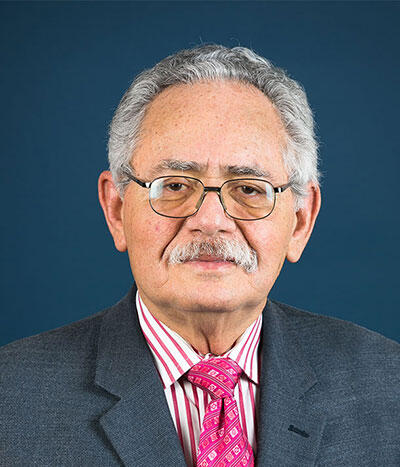
SIPA Remembers Rodolfo de la Garza

Colleagues, family, and friends gathered on November 19 to remember Rodolfo “Rudy” de la Garza, who was Columbia’s Eaton Professor of Administrative Law and Municipal Science and a professor of international and public affairs at SIPA.
The late scholar, who died on August 5 at the age of 75, had been a member of Columbia’s faculty since 2001. He was known for his work in the fields of political behavior, Latino electoral involvement, and immigration policy.
In the tribute held at the International Affairs Building, academic colleagues spoke of de la Garza’s impact as a scholar and a friend. Some participated via video link from locations including Florida, Texas, and California, with more than a dozen, all told, taking part.
Professor Robert Shapiro, who recruited de la Garza to Columbia when the former was chair of the political science department, quoted from the report he prepared at the time:
“De la Garza ... is one of, if not the single most, important and productive scholars in the field of Latino politics. He has been the path-breaker in bringing the study of Latino political behavior and politics into the mainstream of American political science.”
On a personal note, Shapiro recalled:
“Rudy’s arrival [at Columbia] lifted my spirits. And even more when he stopped by my office as he often did, and said, ‘You know, I really love Columbia.’ What he loved he said was the deep intellectual environment here that he did not have elsewhere.
“Rudy also taught me everything I know about Latino politics.”
Assistant Professor Paul Lagunes of SIPA sent a note:
“Rudy was instrumental to my feeling at home at Columbia. His fellowship and advice meant a lot to me, as did his example. I found Rudy’s commitment to political science and Latino politics inspiring. His stories and sense of humor lightened my day-to-day.”
Professor Robert Jervis, a faculty member at Columbia and SIPA for almost 40 years, said, in part:
“Rudy reveled in both the substance of political issues and the processes of politics. This was not at only the national level. He knew the politics of individual congressional districts. He could explain how they changed over time and how they compared with one another. This was more than abstract and aggregate behavior; it was how people sought to improve their lives and further their values.
“Rudy’s love for politics was married to a deep integrity. This manifested itself in two primary ways. First,he was able to separate his political presences from his analyses of what was happening.… he did not let what he wanted sway what he thought would happen.
“Rudy’s integrity [also] made him the conscience of the political science department and SIPA. He would always make us face difficult issues that we would prefer not to talk about, including whether we were living up to our commitment to diversity, were really being honest in difficult personnel discussions, or were treating students with the appropriate care and attention. We often tried to take the easy way out; Rudy would not let us. He was never self-righteous in these moments, but neither would he let us or himself of the hook.
“We were a better institution and better as individuals with Rudy around. Our memories of him will have to sustain us.”
Dean Merit E. Janow shared her reminiscence with SIPA News:
“He was a remarkable scholar, a beloved teacher, and a wonderful colleague. Many of us shall remember him not only for his path-breaking academic work, but his tremendous wit and humanity.”
De la Garza wrote or edited 10 books over his career, and his academic publications often found homes in leading journals such as the American Journal of Political Science, Latin American Research Review, Social Science Quarterly, and International Migration Review.
Several of his works are considered essential within the world of political science and international and public affairs, often receiving high praise for their contribution to topics like Latino voting in the U.S., immigration policy, and the political economy of migrant worker remittances. Reviews like the one from the American Library Association given to Muted Voices: Latinos and the 2000 Election, a collection edited by de la Garza, were common: “Should be required reading for public officials, political candidates, and policy advisers.”
His insight and passion were also evident in his work to improve the world around him. He designed programs to increase immigrant access to health services in California and evaluated Texas’s state-sponsored naturalization campaign. He served as vice president of the American Political Science Association and in 1993 received the lifetime achievement award from APSA’s Committee on the Status of Latinos in the Profession.
Recognized by his colleagues as one of the founders of the field of Latino political studies, de la Garza was influence by the diverse and adventurous life he led before becoming an academic.
His mother, a Mexican immigrant, was an accomplished pianist who was Placido Domingo’s first music teacher. His father was a cook at the University of Arizona. De la Garza would frequently accompany his father to work at the university, which he later attended as a student— ultimately receiving four degrees.
In the late 1960s and early 1970s, during the height of the Cold War, de la Garza served with the U.S. Information Agency in Bolivia as a student affairs officer. An American political interlocutor and advocate for fair elections, equality, and good governance during a tumultuous time for Central and South America, de la Garza also conducted work in Cuba, Mexico, and the Dominican Republic.
De la Garza is survived by his wife, Ileana, their daughter, Sofia, and two sons, David and Daniel.
— Dominick Tao MPA ‘19
SIPA faculty members who wish to add their own reminiscences of Rudy de la Garza may contact Marcus Tonti.